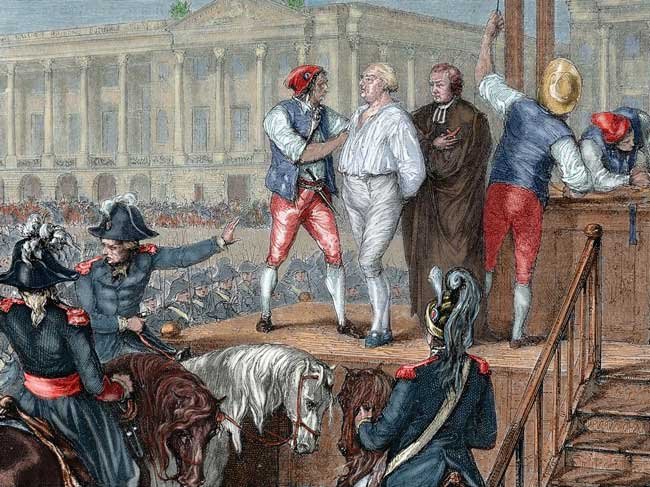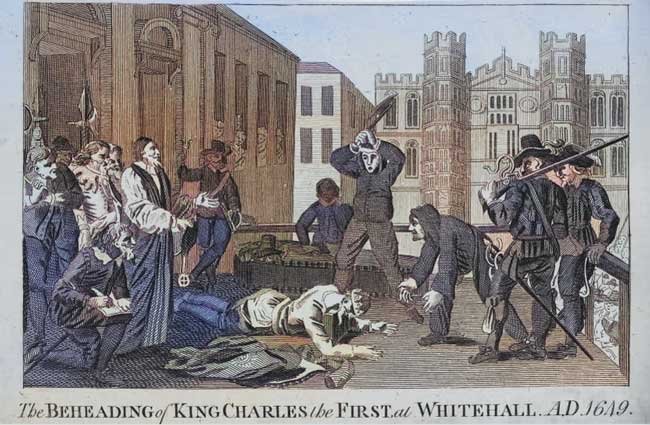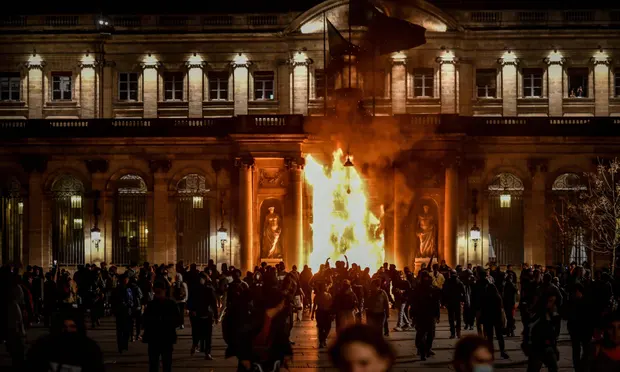King Charles’s visit to France postponed amid protests
Emmanuel Macron says it would not have been ‘serious or good sense’ for next week’s visit to go ahead.
As the flames of discontent rage across France, fanned by the winds of President Emmanuel Macron’s pension reform, you cannot help but be reminded of the echoes of a revolution that once shook both France and Britain to its core. Even today the French Revolution strikes fear within the establishment, etched into their collective memories the understanding of how tenuous their position of power is when the masses realise their own potential.
The recent postponement of King Charles’s state visit to France, including a lavish banquet at the Palace of Versailles, serves as a stark reminder of the turbulent history between extravagance and uprising when so many are struggling and the few really don’t care.
The events of the French Revolution and the English Civil War are stark reminders of the power of the people. When the masses rise up and unite, they become an unstoppable force that can topple even the mightiest of kings.

Peter Ricketts, a former British ambassador to France, astutely observed that the opulent dinner, scheduled amidst widespread protests, could have evoked memories of the French Revolution. The violent clashes between police and protesters, resulting in hundreds of injuries and arrests, paint a grim backdrop for a royal procession.
The revolutionary spirit of 18th-century France, which saw the fall of the monarchy and the rise of a republic, stemmed from the stark contrast between the opulence of Louis XVI’s court and the dire living standards of the masses. The proposed banquet at Versailles, a symbol of royal excess, would have been a particularly ill-timed affair given the current climate of unrest.

Ricketts’ observation that the Versailles banquet was a “particularly bad idea” due to its revolutionary connotations seems almost an understatement. With Bordeaux’s 18th-century front door set ablaze and concerns that protesters would target the Palace of Versailles, it is evident that the circumstances for a royal visit are far from ideal.
This week witnessed French union members, carrying flags and banners, flanked by their own stewards to ensure their security. The crowd was dense and angry with the government and president, but the mood was also festive and motivated by a show of solidarity.
Emmanuel Macron felt the full force of French anger on Thursday as protesters gathered across the country to demonstrate their opposition to the pension age being raised from 62 to 64.
Unions claimed 3.5 million people turned out across the country, while the authorities suggested the figure was much lower, at just under 1.1 million.
In Paris, union leaders claimed that a record 800,000 people took part in a mostly peaceful march through the city
There were outbreaks of violence and vandalism. In the southwestern city of Bordeaux, the front door of the city hall was set on fire, while in Paris police and groups of protesters clashed late into the night.

It was clear after protesters set fire to the city’s historic 18th-century front door, that concerns would grow that the Palace of Versailles might suffer a similar fate. Sylvie Bermann, a former French ambassador to the UK, expressed her belief that images of King Charles travelling through Paris amidst the grandeur of a state visit “would not have been good.”
With the visit now postponed until the summer, one can only hope that the French government will take this opportunity to address the grievances of its people. In the meantime, the spectre of revolutions past serves as a potent reminder of the consequences of unchecked extravagance and the importance of heeding the voices of the disenchanted.
The lessons of the past have not been learnt and while ever the people suffer only a growing discontent will rise and we all know where that leads…
Support Independent Journalism Today
Our unwavering dedication is to provide you with unbiased news, diverse perspectives, and insightful opinions. We're on a mission to ensure that those in positions of power are held accountable for their actions, but we can't do it alone. Labour Heartlands is primarily funded by me, Paul Knaggs, and by the generous contributions of readers like you. Your donations keep us going and help us uphold the principles of independent journalism. Join us in our quest for truth, transparency, and accountability – donate today and be a part of our mission!
Like everyone else, we're facing challenges, and we need your help to stay online and continue providing crucial journalism. Every contribution, no matter how small, goes a long way in helping us thrive. By becoming one of our donors, you become a vital part of our mission to uncover the truth and uphold the values of democracy.
While we maintain our independence from political affiliations, we stand united against corruption, injustice, and the erosion of free speech, truth, and democracy. We believe in the power of accurate information in a democracy, and we consider facts non-negotiable.
Your support, no matter the amount, can make a significant impact. Together, we can make a difference and continue our journey toward a more informed and just society.
Thank you for supporting Labour Heartlands












